Our Team
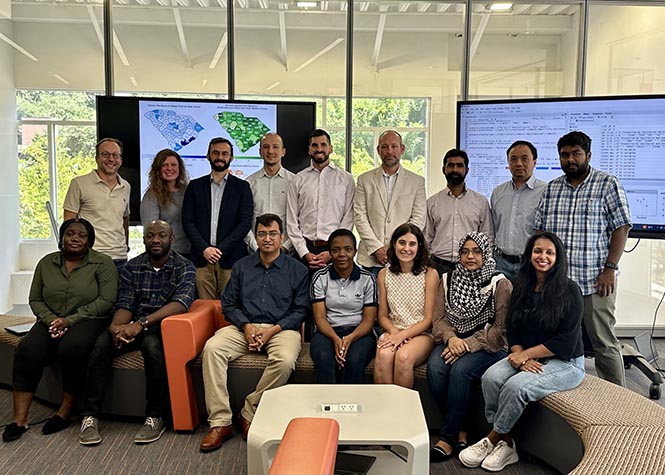
The Clemson University Center for Public Health Modeling and Response team comprises dedicated Clemson University faculty, affiliated faculty and graduate researchers, all committed to leveraging data-driven methodologies to enhance public health outcomes. Our collective expertise spans a broad spectrum of disciplines, enabling us to tackle complex public health challenges with innovative solutions. We pride ourselves on our collaborative approach, integrating the knowledge and skills of our team to drive impactful research and deliver actionable insights for health organizations and communities.
 Lior Rennert, Ph.D.
Lior Rennert, Ph.D.
Lior Rennert, Ph.D., is the associate dean for health sciences in the College of Behavioral, Social, and Health Sciences, associate professor of biostatistics in the Department of Public Health Sciences and founding director of the Clemson Center for Public Health Modeling and Response. He received his doctorate degree in biostatistics from the University of Pennsylvania’s Pearlman School of Medicine, a Master of Science in statistics from the University of Chicago and Bachelor of Science in mathematics from The Pennsylvania State University.
Rennert’s current work focuses on the development of data-driven approaches to guide health-related decision making. His research has led to high-impact publications in the top scientific, medical and health journals. He has procured approximately $30 million in funding as principal investigator from the National Institutes of Health and Centers for Disease Control and Prevention. His projects aim to develop a statewide network for real-time opioid and infectious disease outbreak detection, forecasting and coordinating emergency health response. In these efforts, Rennert has helped build statewide and national collaborations between state health departments, health systems, community partners and academic institutions in order to integrate Center research into practice and ultimately improve health outcomes across the state of South Carolina and the nation.
Core Faculty
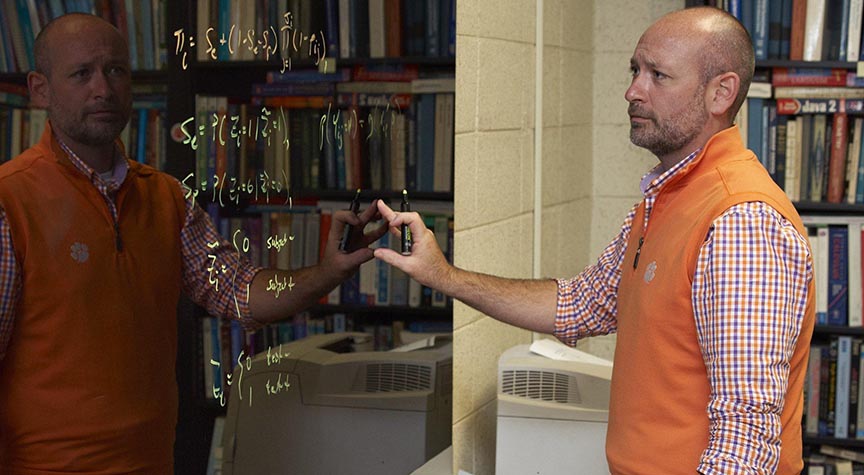
-
Christopher McMahan, Ph.D, Professor, Associate Director for Graduate Studies
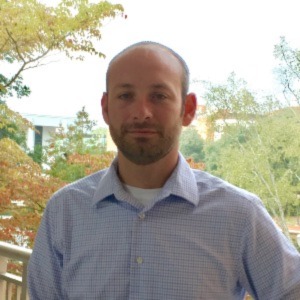 Christopher McMahan, Ph.D., is a professor and the associate director for graduate studies in the School of Mathematical and Statistical Sciences at Clemson University. He received his doctorate from the University of South Carolina in statistics and a Master of Science from Western Kentucky University in mathematics. McMahan has extensive expertise in machine learning and artificial intelligence applications and disease mapping and forecasting. During the 2020-2021 academic year, McMahan was a member of the public health strategy team which provided public health guidance to Clemson University. In 2022, McMahan was named an American Statistical Association fellow, one of the highest honors for statisticians, due to his exceptional contributions to statistical science, collaboration with researchers internationally and promotion of scientific discovery across disciplines.
Christopher McMahan, Ph.D., is a professor and the associate director for graduate studies in the School of Mathematical and Statistical Sciences at Clemson University. He received his doctorate from the University of South Carolina in statistics and a Master of Science from Western Kentucky University in mathematics. McMahan has extensive expertise in machine learning and artificial intelligence applications and disease mapping and forecasting. During the 2020-2021 academic year, McMahan was a member of the public health strategy team which provided public health guidance to Clemson University. In 2022, McMahan was named an American Statistical Association fellow, one of the highest honors for statisticians, due to his exceptional contributions to statistical science, collaboration with researchers internationally and promotion of scientific discovery across disciplines. -
Federico Iuricich, Ph.D., Assistant Professor
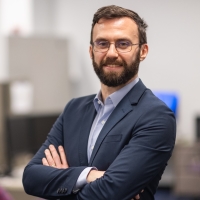 Federico Iuricich is an assistant professor in the School of Computing at Clemson University. He received his doctorate and master’s degrees in computer science from the University of Genova in Italy. Iuricich has specialized training in spatial data analysis and data visualization, including development of open-source products for large-scale 3D visualization, educational material using visualization to disseminate advanced concepts in mathematics and lightweight visualization toolkits. Iuricich has collaborated with Lior Rennert on numerous projects, as lead in the development of visual interfaces for mobile health clinic resource allocation toolkits.
Federico Iuricich is an assistant professor in the School of Computing at Clemson University. He received his doctorate and master’s degrees in computer science from the University of Genova in Italy. Iuricich has specialized training in spatial data analysis and data visualization, including development of open-source products for large-scale 3D visualization, educational material using visualization to disseminate advanced concepts in mathematics and lightweight visualization toolkits. Iuricich has collaborated with Lior Rennert on numerous projects, as lead in the development of visual interfaces for mobile health clinic resource allocation toolkits. -
Md Sakhawat Hossain, Ph.D., Research Assistant Professor
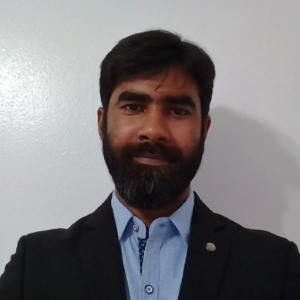 Md Sakhawat Hossai, Ph.D., is a research assistant professor in the Center for Public Health Modeling and Response. He received his doctorate from Texas Tech University in statistics and Master of Science from Clemson University in mathematics. His expertise is in development of predictive modeling frameworks, parameter identification and numerical optimization. His role in the Center focuses on development, optimization and calibration of predictive modeling frameworks for infectious diseases.
Md Sakhawat Hossai, Ph.D., is a research assistant professor in the Center for Public Health Modeling and Response. He received his doctorate from Texas Tech University in statistics and Master of Science from Clemson University in mathematics. His expertise is in development of predictive modeling frameworks, parameter identification and numerical optimization. His role in the Center focuses on development, optimization and calibration of predictive modeling frameworks for infectious diseases. -
Aakash Pandey, Ph.D, Research Assistant Professor
 Aakash Pandey, Ph.D., is a research assistant professor at the Center for Public Health Modeling and Response. He received his doctorate from Kansas State University in biology. Before joining the Center, he was a modeling fellow at the U.S. Centers for Disease Control and Prevention. His expertise lies in infectious disease modeling, outbreak analytics and disease ecology and evolution. His research focuses on two main areas: Identifying intervention strategies to control infectious disease dynamics in human and animal populations and developing tools to assess the risk of potential outbreaks in different populations.
Aakash Pandey, Ph.D., is a research assistant professor at the Center for Public Health Modeling and Response. He received his doctorate from Kansas State University in biology. Before joining the Center, he was a modeling fellow at the U.S. Centers for Disease Control and Prevention. His expertise lies in infectious disease modeling, outbreak analytics and disease ecology and evolution. His research focuses on two main areas: Identifying intervention strategies to control infectious disease dynamics in human and animal populations and developing tools to assess the risk of potential outbreaks in different populations. -
Lu Zhong, Ph.D., Research Assistant Professor
 Lu Zhong, Ph.D., is a research assistant professor in the Center of Public Health Modeling and Response at Clemson University. She earned her doctorate in data science from the City University of Hong Kong. Prior to joining Clemson, she was a postdoctoral research associate in the Department of Computer Science at Rensselaer Polytechnic Institute in New York. Her research expertise includes computational epidemiology, network epidemiology, machine learning and complex systems. Currently, her work focuses on computational epidemiology and enhancing healthcare resilience for crisis preparedness and response.
Lu Zhong, Ph.D., is a research assistant professor in the Center of Public Health Modeling and Response at Clemson University. She earned her doctorate in data science from the City University of Hong Kong. Prior to joining Clemson, she was a postdoctoral research associate in the Department of Computer Science at Rensselaer Polytechnic Institute in New York. Her research expertise includes computational epidemiology, network epidemiology, machine learning and complex systems. Currently, her work focuses on computational epidemiology and enhancing healthcare resilience for crisis preparedness and response. -
MinJae Woo, Ph.D., Assistant Professor
 MinJae Woo, Ph.D., is an assistant professor of health informatics in the Department of Public Health Sciences. He received his doctorate from the Clemson University and Medical University of South Carolina joint program in biomedical data science and informatics. Woo is a multidisciplinary researcher whose research interests lie in artificial intelligence (AI) in healthcare, focusing on its application in predictive analytics and public health intelligence. He has led a multi-institutional team of health scientists and computer scientists with one shared goal of revolutionizing health interventions through technology.
MinJae Woo, Ph.D., is an assistant professor of health informatics in the Department of Public Health Sciences. He received his doctorate from the Clemson University and Medical University of South Carolina joint program in biomedical data science and informatics. Woo is a multidisciplinary researcher whose research interests lie in artificial intelligence (AI) in healthcare, focusing on its application in predictive analytics and public health intelligence. He has led a multi-institutional team of health scientists and computer scientists with one shared goal of revolutionizing health interventions through technology. -
Brian Witrick, Ph.D., Assistant Professor
 Brian Witrick, Ph.D., is an assistant professor in the Department of Public Health at Clemson University. He received his doctorate from Clemson University in applied health research and evaluation and a Master of Public Health from Armstrong Atlantic State University in epidemiology. Witrick has expertise in spatial epidemiological methods, including small area estimation and spatio-temporal modeling. He has experience in research working to provide clinicians with the best evidence to support the care of patients with cardiovascular disease. His current research focuses on cardiovascular epidemiology and the use of spatial analysis to improve clinical practice in South Carolina. Witrick is an incoming embedded scholar with the South Carolina Department of Public Health.
Brian Witrick, Ph.D., is an assistant professor in the Department of Public Health at Clemson University. He received his doctorate from Clemson University in applied health research and evaluation and a Master of Public Health from Armstrong Atlantic State University in epidemiology. Witrick has expertise in spatial epidemiological methods, including small area estimation and spatio-temporal modeling. He has experience in research working to provide clinicians with the best evidence to support the care of patients with cardiovascular disease. His current research focuses on cardiovascular epidemiology and the use of spatial analysis to improve clinical practice in South Carolina. Witrick is an incoming embedded scholar with the South Carolina Department of Public Health. -
Sarah F. Griffin, Ph.D., Professor
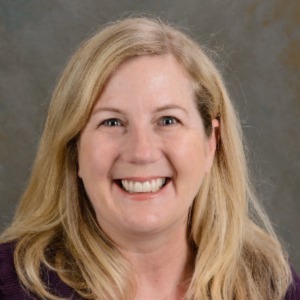 Sarah Griffin, Ph.D., is a professor in the Department of Public Health Sciences at Clemson University. She received her doctorate in public health and Master of Public Health in health promotion, education and behavior degrees from the University of South Carolina. She is a health researcher with extensive community-based research experience and expertise in implementation research. Griffin's research is focused on the efficacy and effectiveness of complex interventions to improve health. She often uses mixed-method approaches to assess the effectiveness of community, clinical and school-based interventions in South Carolina. Currently, Griffin serves as co-PI for a Centers for Disease Control and Prevention obesity prevention initiative.
Sarah Griffin, Ph.D., is a professor in the Department of Public Health Sciences at Clemson University. She received her doctorate in public health and Master of Public Health in health promotion, education and behavior degrees from the University of South Carolina. She is a health researcher with extensive community-based research experience and expertise in implementation research. Griffin's research is focused on the efficacy and effectiveness of complex interventions to improve health. She often uses mixed-method approaches to assess the effectiveness of community, clinical and school-based interventions in South Carolina. Currently, Griffin serves as co-PI for a Centers for Disease Control and Prevention obesity prevention initiative. -
Md Tareq Khan, Ph.D., Assistant Professor
 Md Tareq Ferdous Khan, Ph.D., is an assistant professor of biostatistics in the Department of Public Health Sciences at Clemson University. He earned his doctorate in biostatistics (big data track) from the Division of Biostatistics and Bioinformatics at the University of Cincinnati College of Medicine. Khan began his career as a researcher in Bangladesh after completing his first Master of Science in statistics. He also earned a second master’s in applied mathematics and statistics from Florida Atlantic University. Khan’s research interests focus on developing statistical methodologies and applications of statistical modeling in health outcomes and risk factors.
Md Tareq Ferdous Khan, Ph.D., is an assistant professor of biostatistics in the Department of Public Health Sciences at Clemson University. He earned his doctorate in biostatistics (big data track) from the Division of Biostatistics and Bioinformatics at the University of Cincinnati College of Medicine. Khan began his career as a researcher in Bangladesh after completing his first Master of Science in statistics. He also earned a second master’s in applied mathematics and statistics from Florida Atlantic University. Khan’s research interests focus on developing statistical methodologies and applications of statistical modeling in health outcomes and risk factors.
Research and Administrative Personnel
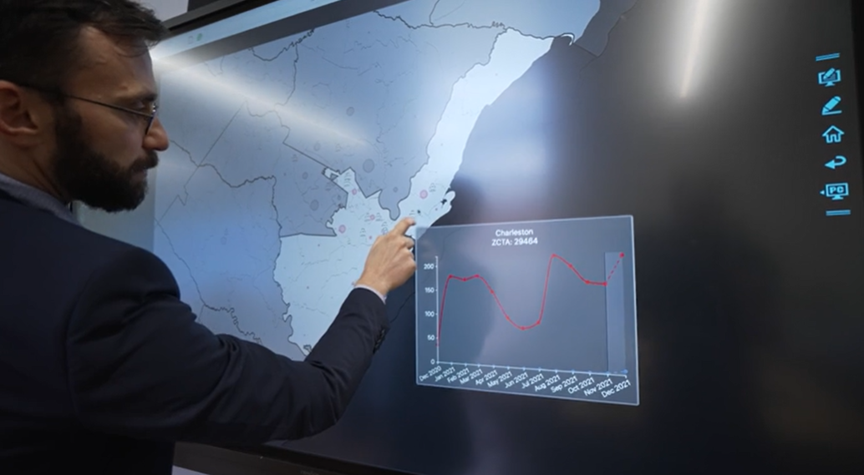
-
Kerry A. Howard, Ph.D., Research Manager
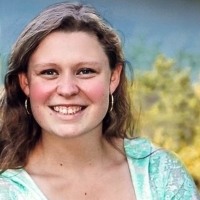 Kerry Howard, Ph.D. is the research manager at the Center for Public Health Modeling and Response. She received her doctorate degree from Clemson University in applied health research and evaluation and a Master of Science from Seton Hall University in experimental psychology and cognitive neuroscience. Her research focuses on data-driven examinations of delivery of care through mobile health clinics, as well as methodology that impacts decision-making in the prevention and treatment of cognitive decline and Alzheimer’s Disease, opioid use disorder, Hepatitis C and community child safety. Howard has performed research in the fields of health and psychology over the course of her career, accumulating extensive experience with research design, data maintenance and analysis and scientific writing, as well as an understanding of how these areas can be applied to improve real-world outcomes and disseminate findings to the community.
Kerry Howard, Ph.D. is the research manager at the Center for Public Health Modeling and Response. She received her doctorate degree from Clemson University in applied health research and evaluation and a Master of Science from Seton Hall University in experimental psychology and cognitive neuroscience. Her research focuses on data-driven examinations of delivery of care through mobile health clinics, as well as methodology that impacts decision-making in the prevention and treatment of cognitive decline and Alzheimer’s Disease, opioid use disorder, Hepatitis C and community child safety. Howard has performed research in the fields of health and psychology over the course of her career, accumulating extensive experience with research design, data maintenance and analysis and scientific writing, as well as an understanding of how these areas can be applied to improve real-world outcomes and disseminate findings to the community. -
Jiande Wu, Ph.D., Data Manager/Data Scientist
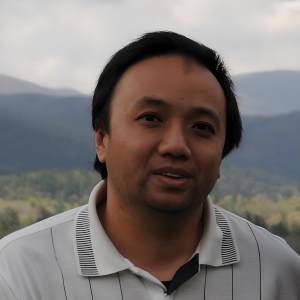 Jiande Wu, Ph.D., is the data manager/data scientist at the Center for Public Health Modeling and Response. He received his doctorate degree and Master of Science from the University of New Orleans in electrical engineering. He also holds master’s and bachelor’s degrees from North China Electric Power University in computer science and engineering. Wu possesses extensive training expertise in the field of computational genomics and data analysis. His research primarily focuses on the development and application of advanced big data analysis techniques and computational genomic methods. Wu currently serves as the Center’s data manager and is responsible for data extraction and management of electronic health records (EHR) data. He is also responsible for overseeing the application of machine learning techniques for prediction, including the development of early warning systems for infectious disease outbreaks based on digital trace data.
Jiande Wu, Ph.D., is the data manager/data scientist at the Center for Public Health Modeling and Response. He received his doctorate degree and Master of Science from the University of New Orleans in electrical engineering. He also holds master’s and bachelor’s degrees from North China Electric Power University in computer science and engineering. Wu possesses extensive training expertise in the field of computational genomics and data analysis. His research primarily focuses on the development and application of advanced big data analysis techniques and computational genomic methods. Wu currently serves as the Center’s data manager and is responsible for data extraction and management of electronic health records (EHR) data. He is also responsible for overseeing the application of machine learning techniques for prediction, including the development of early warning systems for infectious disease outbreaks based on digital trace data. -
Emily Serman, Ph.D., Research Associate
 Emily Serman, Ph.D., is a research associate at the Center for Public Health Modeling and Response. She received her doctorate degree in population, health, and place from the University of Southern California and her Master of Science in civil and environmental engineering from the University of Rhode Island. Her research focuses on the intersection of climate and infectious disease dynamics, leveraging large-scale data assets and geospatial analysis. She is also broadly interested in infectious disease epidemiology and social determinants of health.
Emily Serman, Ph.D., is a research associate at the Center for Public Health Modeling and Response. She received her doctorate degree in population, health, and place from the University of Southern California and her Master of Science in civil and environmental engineering from the University of Rhode Island. Her research focuses on the intersection of climate and infectious disease dynamics, leveraging large-scale data assets and geospatial analysis. She is also broadly interested in infectious disease epidemiology and social determinants of health. -
Iromi Jayawardena, Ph.D., Research Associate
 Iromi Jayawardena, Ph.D., is a research associate at the Center for Public Health Modeling and Response. She received her doctorate in applied health research and evaluation at Clemson University and her Master of Science degree from Sam Houston State University in statistics. Her primary research projects focus on the use of data-driven approaches for healthcare uptake in communities in South Carolina through mobile health clinics.
Iromi Jayawardena, Ph.D., is a research associate at the Center for Public Health Modeling and Response. She received her doctorate in applied health research and evaluation at Clemson University and her Master of Science degree from Sam Houston State University in statistics. Her primary research projects focus on the use of data-driven approaches for healthcare uptake in communities in South Carolina through mobile health clinics. -
Karen Atkinson, Administrative Coordinator
 Karen Atkinson is the administrative coordinator for the Center for Public Health Modeling and response and research program manager within the Department of Public Health Sciences. She received her Master of Science from Furman University in exercise physiology. She has contributed to various projects for the Centers for Disease Control and Prevention, Department of Defense, United States Agency for International Development, National Institutes of Health, American Heart Association and many others, as well as managed budgets of a combined total of $30 million. She has performed research in the fields of high obesity prevention, mobile health, remote patient monitoring, diabetes prevention and rural health.
Karen Atkinson is the administrative coordinator for the Center for Public Health Modeling and response and research program manager within the Department of Public Health Sciences. She received her Master of Science from Furman University in exercise physiology. She has contributed to various projects for the Centers for Disease Control and Prevention, Department of Defense, United States Agency for International Development, National Institutes of Health, American Heart Association and many others, as well as managed budgets of a combined total of $30 million. She has performed research in the fields of high obesity prevention, mobile health, remote patient monitoring, diabetes prevention and rural health. -
Grace Austen, Research Associate

Grace Austen is a research associate with the School of Computing at Clemson University. She received her Master of Science degree in computer science from Clemson. Her degree concentration was in data science and informatics; she also took an interest in visualization. She worked on several research projects as a student at Clemson and is now collaborating with the Center for Public Health Modeling and Response to create visualizations for infectious diseases that will support public health organizations and decision makers.
Affiliated Faculty
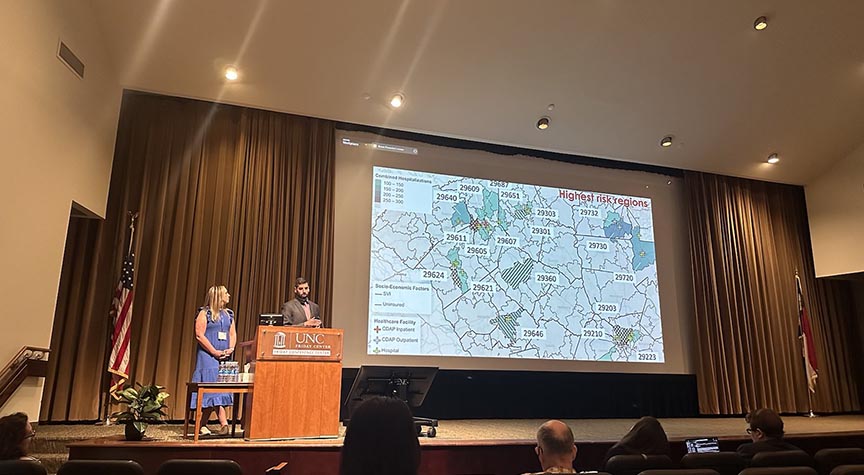
-
Erin Ash, Ph.D., Associate Professor
 Erin Ash is an associate professor of communication at Clemson University. She received her Master of Arts in media studies and doctorate in mass communications from Pennsylvania State University. Her research focuses on the role of media in public perceptions of social issues, including attitudes towards health-related behaviors and policies. She is an incoming embedded scholar with the South Carolina Department of Public Health, where she will collaborate with the agency to support state goals related to family planning and reproductive health.
Erin Ash is an associate professor of communication at Clemson University. She received her Master of Arts in media studies and doctorate in mass communications from Pennsylvania State University. Her research focuses on the role of media in public perceptions of social issues, including attitudes towards health-related behaviors and policies. She is an incoming embedded scholar with the South Carolina Department of Public Health, where she will collaborate with the agency to support state goals related to family planning and reproductive health. - Brandon Boatwright, Ph.D., Director, Social Media Listening Center; Associate Professor
-
Kathleen Cartmell, Ph.D., Research Faculty
 Kathleen Cartmell, Ph.D., is research faculty in the Department of Public Health Sciences at Clemson University. She received her doctorate from the Medical University of South Carolina in health and rehabilitation sciences and a Master of Public Health from the Emory University Rollins School of Public Health. She is a health services researcher with a focus on dissemination and implementation of evidence-based strategies for disease prevention and control.
Kathleen Cartmell, Ph.D., is research faculty in the Department of Public Health Sciences at Clemson University. She received her doctorate from the Medical University of South Carolina in health and rehabilitation sciences and a Master of Public Health from the Emory University Rollins School of Public Health. She is a health services researcher with a focus on dissemination and implementation of evidence-based strategies for disease prevention and control. -
Delphine Dean, Ph.D., Professor
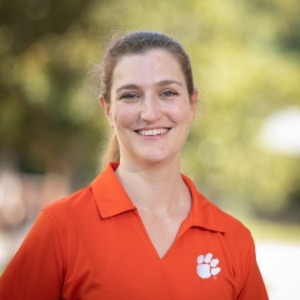 Delphine Dean, Ph.D., is a Ron and Jane Lindsay Family Innovation Professor in the Department of Bioengineering at Clemson University. She received her doctorate and Master of Engineering degrees from the Massachusetts Institute of Technology in electrical engineering and computer science. She is the director and founder of the Clemson Center for Innovative Medical Devices and Sensors and the Research Education in Disease Diagnosis and Intervention (REDDI) Lab.
Delphine Dean, Ph.D., is a Ron and Jane Lindsay Family Innovation Professor in the Department of Bioengineering at Clemson University. She received her doctorate and Master of Engineering degrees from the Massachusetts Institute of Technology in electrical engineering and computer science. She is the director and founder of the Clemson Center for Innovative Medical Devices and Sensors and the Research Education in Disease Diagnosis and Intervention (REDDI) Lab. -
David Freedman, Ph.D., Department Chair, Professor
 David Freedman, Ph.D., is a professor and the chair in the Department of Environmental Engineering and Earth Sciences at Clemson University. He received his doctorate and Master of Science in environmental Engineering from Cornell University and the University of Cincinnati, respectively. His research focuses on hazardous waste management, water and wastewater treatment and methodology for biodegrading hazardous organic contaminants.
David Freedman, Ph.D., is a professor and the chair in the Department of Environmental Engineering and Earth Sciences at Clemson University. He received his doctorate and Master of Science in environmental Engineering from Cornell University and the University of Cincinnati, respectively. His research focuses on hazardous waste management, water and wastewater treatment and methodology for biodegrading hazardous organic contaminants. -
Fatih Gezer, Ph.D., Lecturer
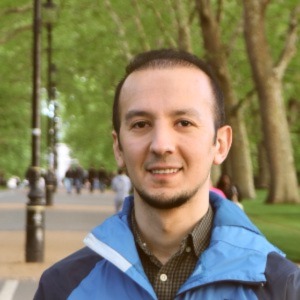 Fatih Gezer, Ph.D., is a former research associate at the Center for Public Health Modeling and Response and currently works as a lecturer at the Department of Economics at Social Sciences University of Ankara. He received his doctorate in statistics from the University of Leeds in the United Kingdom and his Master of Science in statistics from the University of Delaware. His areas of expertise include spatial and spatio-temporal statistics, biostatistics, computational statistics and data visualization. His collaborative work with the CPHMR focuses on statistical modeling of healthcare data obtained from health systems and mobile health clinics.
Fatih Gezer, Ph.D., is a former research associate at the Center for Public Health Modeling and Response and currently works as a lecturer at the Department of Economics at Social Sciences University of Ankara. He received his doctorate in statistics from the University of Leeds in the United Kingdom and his Master of Science in statistics from the University of Delaware. His areas of expertise include spatial and spatio-temporal statistics, biostatistics, computational statistics and data visualization. His collaborative work with the CPHMR focuses on statistical modeling of healthcare data obtained from health systems and mobile health clinics. -
Ronald Gimbel, Ph.D., Director of Clemson Rural Health, Professor
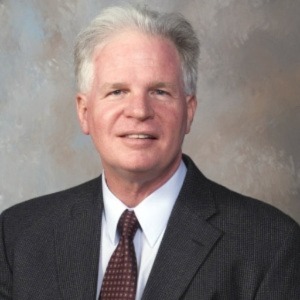 Ronald Gimbel, Ph.D., is a professor in the Department of Public Health Sciences at Clemson University and director of Clemson Rural Health. He received his doctorate from the State University of New York at Albany in public administration and policy and a Master of Arts from Webster University in management. The Clemson Rural Health organization operates rural health clinics, a fleet of mobile health units, telehealth services, and other technologies to enhance overall wellness in South Carolina communities.
Ronald Gimbel, Ph.D., is a professor in the Department of Public Health Sciences at Clemson University and director of Clemson Rural Health. He received his doctorate from the State University of New York at Albany in public administration and policy and a Master of Arts from Webster University in management. The Clemson Rural Health organization operates rural health clinics, a fleet of mobile health units, telehealth services, and other technologies to enhance overall wellness in South Carolina communities. -
Dr. Alain Litwin, Professor
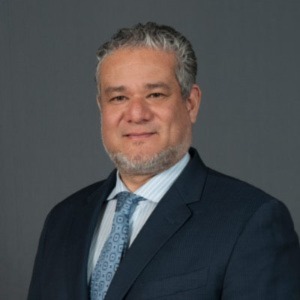 Dr. Alain Litwin is a professor of medicine at the University of South Carolina School of Medicine Greenville, a Professor at Clemson University School of Health Research, executive director of the Addiction Medicine Center at Prisma Health and co-chair of the Prisma Health Opioid Stewardship Council. He received his Doctor of Medicine from Tulane University School of Medicine and specializes in internal and addiction medicine. Through his roles, Dr. Litwin has helped shape public policy through collaboration with community and government organizations to develop clinical guidelines and expand access to treatments.
Dr. Alain Litwin is a professor of medicine at the University of South Carolina School of Medicine Greenville, a Professor at Clemson University School of Health Research, executive director of the Addiction Medicine Center at Prisma Health and co-chair of the Prisma Health Opioid Stewardship Council. He received his Doctor of Medicine from Tulane University School of Medicine and specializes in internal and addiction medicine. Through his roles, Dr. Litwin has helped shape public policy through collaboration with community and government organizations to develop clinical guidelines and expand access to treatments. -
Natasha Malmin, Ph.D., Assistant Professor
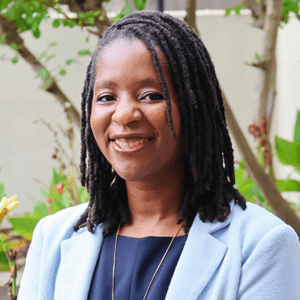 Natasha Malmin, Ph.D., is an assistant professor in the School of Public Health at Georgia State University. She received a joint doctorate in public policy from Georgia Institute of Technology and Georgia State University and a Master of Public Health from Emory University. Prior to her career in academia, she served as a health scientist at the Centers for Disease Control and Prevention for seven years. Her areas of specialization include public health emergency response, school recovery after disasters, participatory geographic information systems mapping and community resilience.
Natasha Malmin, Ph.D., is an assistant professor in the School of Public Health at Georgia State University. She received a joint doctorate in public policy from Georgia Institute of Technology and Georgia State University and a Master of Public Health from Emory University. Prior to her career in academia, she served as a health scientist at the Centers for Disease Control and Prevention for seven years. Her areas of specialization include public health emergency response, school recovery after disasters, participatory geographic information systems mapping and community resilience. -
Rachel Mayo, Ph.D., Professor
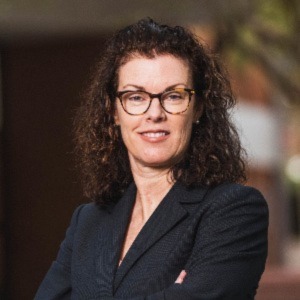 Rachel Mayo, Ph.D., is a professor in the Department of Public Health Sciences. Mayo’s research and evaluation of treatment for newborns with Neonatal Abstinence Syndrome has transformed healthcare research in communities across South Carolina. Her participation on state and national boards, such as the Alliance for a Healthier South Carolina’s Health Disparities Task Force, and Academy Health’s Health Disparities interest group, have led to a shaping of community and public policy.
Rachel Mayo, Ph.D., is a professor in the Department of Public Health Sciences. Mayo’s research and evaluation of treatment for newborns with Neonatal Abstinence Syndrome has transformed healthcare research in communities across South Carolina. Her participation on state and national boards, such as the Alliance for a Healthier South Carolina’s Health Disparities Task Force, and Academy Health’s Health Disparities interest group, have led to a shaping of community and public policy. -
David White, Ph.D., Research Professor
 David White, Ph.D., is a research professor in the Department of Parks, Recreation, and Tourism Management at Clemson University and an expert in Geographic Information Systems (GIS), with over 25 years of experience in spatial data science and environmental data collection and management. White holds a doctorate in marine science. White’s current work focuses on using GIS, machine learning and data analytics to support park management, including research on park location optimization. His recent efforts apply mobility data to analyze visitation trends. In 2023, he was awarded a National Science Foundation Trusted CI Fellowship.
David White, Ph.D., is a research professor in the Department of Parks, Recreation, and Tourism Management at Clemson University and an expert in Geographic Information Systems (GIS), with over 25 years of experience in spatial data science and environmental data collection and management. White holds a doctorate in marine science. White’s current work focuses on using GIS, machine learning and data analytics to support park management, including research on park location optimization. His recent efforts apply mobility data to analyze visitation trends. In 2023, he was awarded a National Science Foundation Trusted CI Fellowship.
Postdoctoral Fellows
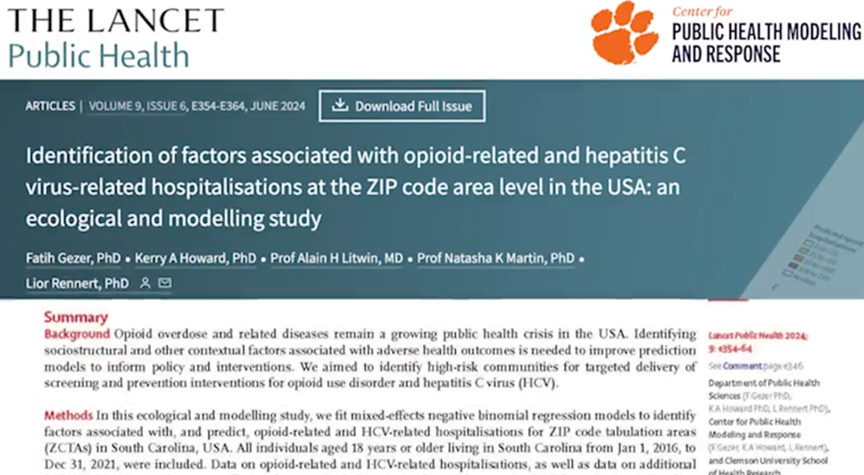
-
Amanda Bleichrodt, Ph.D., Postdoctoral Fellow, Data Science and Forecasting
 Amanda Bleichrodt, Ph.D., is a postdoctoral fellow in the Center for Public Health Modeling and Response, specializing in infectious disease modeling and forecasting. She received her Master of Public Health from The Ohio State University, and a doctorate from Georgia State University in population health Sciences with a concentration in epidemiology. Her research interests include refining and applying various statistical and mathematical modeling toolkits for forecasting disease outbreaks and developing user-friendly forecasting tools.
Amanda Bleichrodt, Ph.D., is a postdoctoral fellow in the Center for Public Health Modeling and Response, specializing in infectious disease modeling and forecasting. She received her Master of Public Health from The Ohio State University, and a doctorate from Georgia State University in population health Sciences with a concentration in epidemiology. Her research interests include refining and applying various statistical and mathematical modeling toolkits for forecasting disease outbreaks and developing user-friendly forecasting tools. -
Shakhawat H. Tanim, Ph.D., Postdoctoral Fellow, GIS and Data Visualization
 Shakhawat Tanim, Ph.D., is a postdoctoral fellow in the Center for Public Health Modeling and Response, specializing in GIS and data visualization. He earned his doctorate in environmental sciences with a concentration in GIS from the University of South Florida and his Master of Science in emergency management from the University of Dhaka. His research focuses on developing geospatial and quantitative methods to explore human-environment interactions, emergency management, human decision-making, transportation planning and resilience development. At the Center, Tanim develops and implements GIS and data visualization methodologies to detect disease hotspots and inform the strategic delivery of mobile health clinics.
Shakhawat Tanim, Ph.D., is a postdoctoral fellow in the Center for Public Health Modeling and Response, specializing in GIS and data visualization. He earned his doctorate in environmental sciences with a concentration in GIS from the University of South Florida and his Master of Science in emergency management from the University of Dhaka. His research focuses on developing geospatial and quantitative methods to explore human-environment interactions, emergency management, human decision-making, transportation planning and resilience development. At the Center, Tanim develops and implements GIS and data visualization methodologies to detect disease hotspots and inform the strategic delivery of mobile health clinics. -
Dongyun Han, Ph.D., Postdoctoral Fellow, Computer Science
 Dongyun Han, Ph.D., is a postdoctoral fellow in the School of Computing. He received his doctorate in the Department of Computer Science from Utah State University. His research expertise include visual analytics, data visualization, virtual reality and human-computer interaction. He earned his master’s and bachelor’s degrees from Ulsan National Institute of Science & Technology (UNIST), South Korea.
Dongyun Han, Ph.D., is a postdoctoral fellow in the School of Computing. He received his doctorate in the Department of Computer Science from Utah State University. His research expertise include visual analytics, data visualization, virtual reality and human-computer interaction. He earned his master’s and bachelor’s degrees from Ulsan National Institute of Science & Technology (UNIST), South Korea.
Graduate Researchers
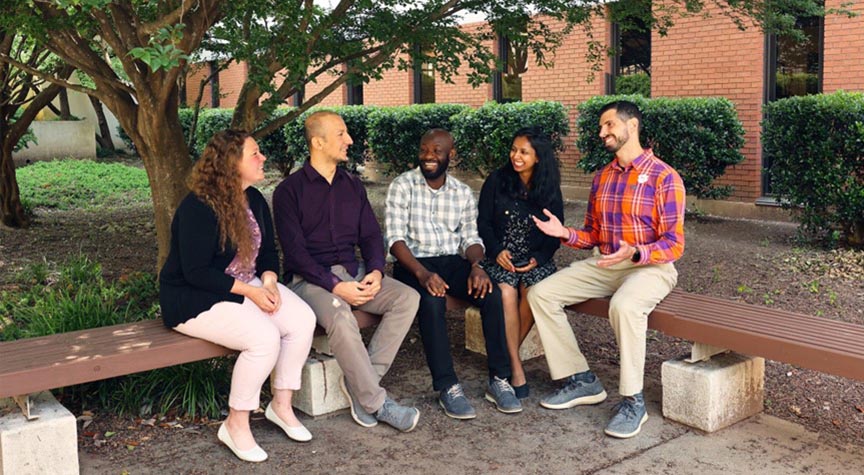
-
Tanvir Ahammed, Graduate Research Assistant
 Tanvir Ahammed is a graduate research assistant in the Department of Public Health Sciences at Clemson University. He received his Master of Science in statistics from Shahjalal University of Science & Technology in Bangladesh and is currently a doctoral student in the Applied Health Research and Evaluation program at Clemson University. His primary research focuses on the application of statistical methodology to public health, including estimation of infectious disease epidemiology.
Tanvir Ahammed is a graduate research assistant in the Department of Public Health Sciences at Clemson University. He received his Master of Science in statistics from Shahjalal University of Science & Technology in Bangladesh and is currently a doctoral student in the Applied Health Research and Evaluation program at Clemson University. His primary research focuses on the application of statistical methodology to public health, including estimation of infectious disease epidemiology. -
Carolina Liskey, Graduate Research Assistant
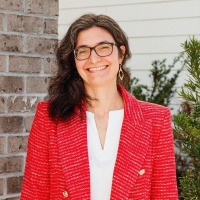 Carolina Liskey is a graduate research assistant for the Center for Public Health Modeling and Response at Clemson University. She received her Master of Science in statistics from Texas A&M University and is currently a doctoral student in the joint Biomedical Data Science and Informatics program at Clemson University and the Medical University of South Carolina. Her primary research projects focus on disease modeling and analytics to support public health initiatives.
Carolina Liskey is a graduate research assistant for the Center for Public Health Modeling and Response at Clemson University. She received her Master of Science in statistics from Texas A&M University and is currently a doctoral student in the joint Biomedical Data Science and Informatics program at Clemson University and the Medical University of South Carolina. Her primary research projects focus on disease modeling and analytics to support public health initiatives. -
Aniqua Anjum, Graduate Research Assistant
 Aniqua Anjum is a graduate research assistant in the Department of Public Health Sciences at Clemson University. She received her Master of Science in statistics from Shahjalal University of Science and Technology in Bangladesh and is currently a doctoral student in the Applied Health Research and Evaluation program at Clemson University. She has extensive experience in various research roles, including contribution to several federally funded projects. Her primary research focuses on applying statistical methods to public health challenges.
Aniqua Anjum is a graduate research assistant in the Department of Public Health Sciences at Clemson University. She received her Master of Science in statistics from Shahjalal University of Science and Technology in Bangladesh and is currently a doctoral student in the Applied Health Research and Evaluation program at Clemson University. She has extensive experience in various research roles, including contribution to several federally funded projects. Her primary research focuses on applying statistical methods to public health challenges.
 Brandon Boatwright, Ph.D., is an assistant professor in the Department of Communication and is the Director of the Social Media Listening Center. He received his doctorate in communication and information from the University of Tennessee and his Master of Science in communication, technology and society from Clemson University.
Brandon Boatwright, Ph.D., is an assistant professor in the Department of Communication and is the Director of the Social Media Listening Center. He received his doctorate in communication and information from the University of Tennessee and his Master of Science in communication, technology and society from Clemson University. 